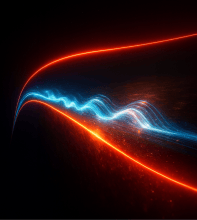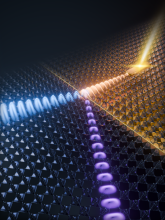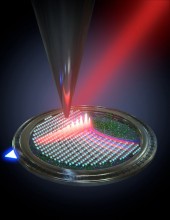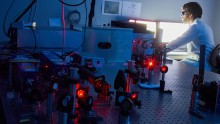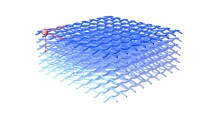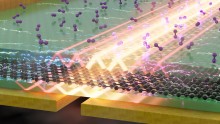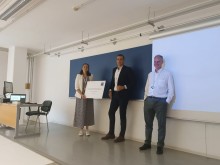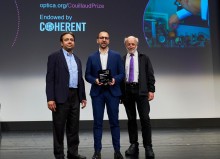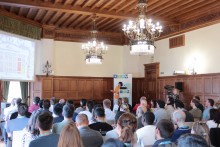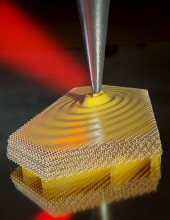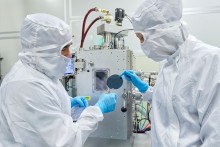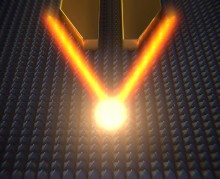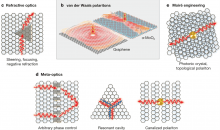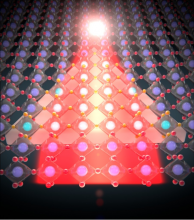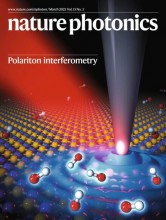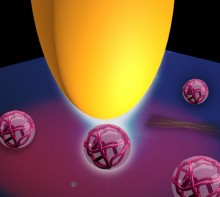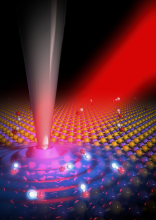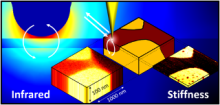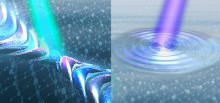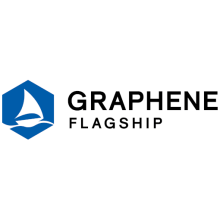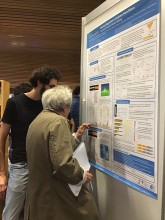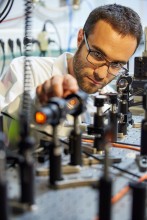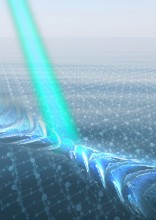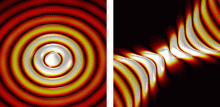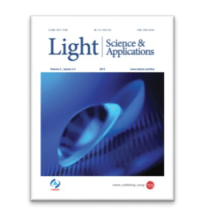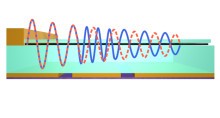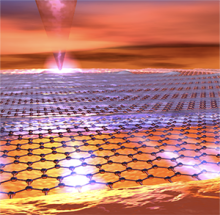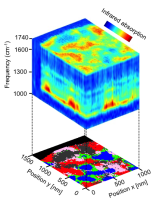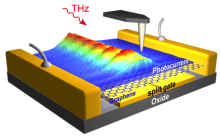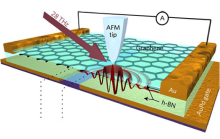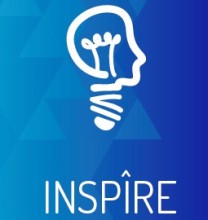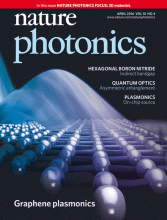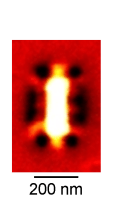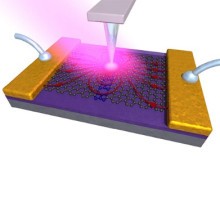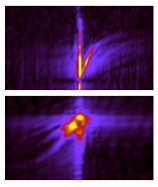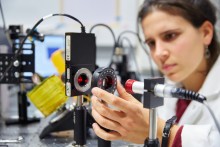Nanooptics News
Latest News
Researchers Observe Flat-Band Ultrastrong Coupling
Two-step excitation unlocks and steers exotic nanolight
Researchers demonstrate direction-dependent vibrational strong coupling at the nanoscale
Researchers from the Quantum Nano-Optics group at the University of Oviedo and the Center for Research on Nanomaterials and Nanotechnology (CINN-CSIC), in collaboration with the 2D Nanophotonics group at the Donostia International Physics Center (DIPC) and the Nanooptics group at CIC nanoGUNE, have observed, for…
Review Article Highlights 25 Years of Modern Near-field Optical Nanoimaging
A newly published review article in Nature Reviews Materials highlights the groundbreaking impact of scattering-type scanning near-field optical microscopy (s-SNOM), a technique that surpasses the diffraction limit to achieve nanoscale optical imaging across a broad spectral range. Authored by leading experts in…
Scientists synthesize 2D polyaniline crystal with unique metallic out-of-plane conductivity
In a recent study published in Nature, an international team of researchers in which nanoGUNE scientists participate has developed a groundbreaking two-dimensional conducting polymer—polyaniline (2DPANI)—that exhibits exceptional electrical conductivity and metallic charge transport behavior. Unlike conventional…
Nano-scale molecular detective: New on-chip device uses exotic light rays in 2D material to detect molecules
María Barra receives the Nanolito award for her Doctoral Thesis
Edoardo Vicentini wins the Bernard J. Couillaud Prize 2023
Teaching the world about cutting-edge tools for nanoscale optical imaging
“When we developed the near-field optical nanoimaging and nanospectroscopy tools, which we named s-SNOM and nano-FTIR, I never thought that they could have such wide application potential”, says Ikerbasque Research Professor Rainer Hillenbrand when asked about the evolution of his field of research. This week, from…
Researchers observe extremely squeezed directional THz waves in thin semiconductor crystals
An international team of scientists from the Basque research center CIC nanoGUNE, Shanghai University for Science and Technology, Fudan University (Shanghai), Brno University of Technology, University of the Basque Country, Materials Physics Center (CSIC-UPV/EHU), Donostia International Physics Center and the Max…
Registration period for the summer internship program open
Researchers develop an innovative strategy to focus infrared light into the nanoscale
An international team of researchers, including members of nanoGUNE's Nanooptics group, publish in “Science Advances” the grounds for the realization of nanodevices that, based on the manipulation of light at the nanoscale, promise the development of extraordinarily sensitive biosensors. The researchers also…
Review: Interface nano-optics with van der Waals polaritons
An international team, including the leader of the Nanooptics group at nanoGUNE, Rainer Hillenbrand, discusses in ‘Nature’ the state-of-the-art and opportunities for controlling the propagation of nanolight (in form of polaritons) in van der Waals materials with the help of classical refractive optics…
Review: Nanoscale terahertz scanning probe microscopy
Four international experts, including the leader of the Nanooptics group at nanoGUNE Rainer Hillenbrand, analyze in ‘Nature Photonics’ the terahertz scanning probe microscopy techniques that achieve spatial resolution on the scale of micrometres to ångströms, with particular emphasis on their overarching approaches…
Understanding nanolight refraction on highly anisotropic materials
An international team of researchers, including members of nanoGUNE's Nanooptics group, unveils in ‘Nature Communications’ fundamental aspects of nanolight refraction in highly anisotropic media. The researchers also report the design of a new planar nanolens 1000 times smaller than the thickness of a human hair,…
CIC nanoGUNE´s research on light covered in Nature Photonics
Researchers from CIC nanoGUNE in collaboration with the Donostia International Physics Center (DIPC) and the University of Oviedo employed a spectroscopic nanoimaging technique to study how infrared nanolight - in form of phonon polaritons - and molecular vibrations interact with each other. The work appears now on…
Nanoparticles as drug carriers
Vibrational Encounters – Phonon Polaritons Meet Molecules
Researchers from CIC nanoGUNE BRTA (San Sebastian, Spain), in collaboration with the Donostia International Physics Center (San Sebastián, Spain) and the University of Oviedo (Spain) employed a spectroscopic nanoimaging technique to study how infrared nanolight - in form of phonon polaritons - and molecular…
nanoGUNE reaches new depths in infrared nanospectroscopy
Researchers from the Nanooptics Group at CIC nanoGUNE demonstrate that nanoscale infrared imaging – which is established as a surface-sensitive technique – can be employed for chemical nanoidentification of materials that are located up to 100 nm below the surface. The results further show that the infrared…
How to manipulate light on the nanoscale over wide frequency ranges
An international team led by researchers from the University of Oviedo and the Centre for Research in Nanomaterials and Nanotechnology (CINN-CSIC), together with scientist from the Basque research centers CIC nanoGUNE, Donostia International Physics Center (DIPC), Materials Physics Center (CSIC-UPV/EHU), and…
CIC nanoGUNE works on infrared sensing and photodetectors within GrapheneCore3
The Nanooptics Group of CIC nanoGUNE is involved in the Work Package 8: Photonics and Optoelectronics in the Graphene Flagship Core 3 project, the fourth funding cycle of the €1 Billion research initiative funded by the European Commission. The mission of Work Package Photonics and Optoelectronics is to develop GRM…
nanoGUNE PhD Workshop 2020
nanoGUNE launches a new summer internship call for university students
Researchers discover directional and long-lived nanolight in a 2D material
An international team led by researchers from Monash University (Melbourne, Australia), University of Oviedo (Asturias, Spain), CIC nanoGUNE (San Sebastián, Spain), and Soochow University (Suzhou, China) discover squeezed light ('nanolight') in the nanoscale that propagates only in specific directions along thin…
Students from UPV / EHU, Tecnun, UAB and the UB carry out summer internships at CIC nanoGUNE
Apply for a Basque PhD grant with nanoGUNE
NanoGUNE, located at the Ibaeta Campus of the UPV/EHU in Donostia – San Sebastián, offers PhD opportunities to graduates in Physics, Chemistry, Engineering, Biology, and related areas to get their PhD degree.
Phononic SEIRA - Enhancing light-molecule interactions via crystal lattice vibrations
Researchers from CIC-nanoGUNE (San Sebastián, Spain), in collaboration with the Donostia International Physics Center (San Sebastián, Spain), Materials Physics Center (CFM, CSIC-UPV/EHU, San Sebastián, Spain) and University of Oviedo demonstrate a new way to strongly couple infrared light and molecular vibrations,…
Basque researchers turn light upside down
Researchers from CIC nanoGUNE (San Sebastian, Spain), in collaboration with the Donostia International Physics Center (DIPC, San Sebastian, Spain) and Kansas State University (USA), report in Science the development of a so called 'hyperbolic metasurface' on which light propagates with completely reshaped…
Boron nitride nanoresonators for phonon-enhanced molecular vibrational spectroscopy at the strong coupling limit
NewsTest
NewsTestintrotext
Ultra-compact phase modulators based on graphene plasmons
Quantum nanoscope
A new dimension in chemical nanoimaging
Researchers from the Basque institutions CIC nanoGUNE, Ikerbasque and Cidetec, and the German Robert Koch-Institut report the development of hyperspectral infrared nanoimaging. It is based on Fourier transform infrared nanospectroscopy (nano-FTIR) and enables highly sensitive spectroscopic imaging of chemical…
On-chip observation of THz graphene plasmons
Researchers developed a technique for imaging THz photocurrents with nanoscale resolution, and applied it to visualize strongly compressed THz waves (plasmons) in a graphene photodetector. The extremely short wavelengths and highly concentrated fields of these plasmons open new venues for the development of…
Graphene does double duty for plasmons
The CENTINELA project, a winner in the Inspire programme
This week Petronor has presented the first appraisal of the agreement with the Department of Economic Development and Competitiveness of the Government of the Basque Autonomous Community (region), and has announced the three award-winning projects in the Inspire open innovation programme. They include the CENTINELA…
nanoGUNE research appears on Nature Photonics cover
Nanolight at the edge
Researchers from CIC nanoGUNE, in collaboration with ICFO and Graphenea, have demonstrated how infrared light can be captured by nanostructures made of graphene. This happens when light couples to charge oscillations in the graphene. The resulting mixture of light and charge oscillations – called plasmon - can be…
New tool for non-invasive quality control of graphene devices
Researchers from the Nanooptics group at CIC nanoGUNE in collaboration with colleagues at ICFO - The Institute of Photonic Sciences (Catalunya) developed a new non-invasive room-temperature technique for graphene device characterization. This work has been funded by the EC Graphene Flagship and was recently…
Tracking slow nanolight in natural hyperbolic metamaterial slabs
Researchers from the Nanooptics and the Nanodevices groups at CIC nanoGUNE (Basque Country) in collaboration with colleagues at ICFO - The Institute of Photonic Sciences (Catalunya) have imaged how light moves inside an exotic class of matter known as hyperbolic materials. They observed, for the first time,…
nanoGUNE Scholarship: call for Master Thesis students
Nanoscale Infrared Near-Field Spectroscopy, PHD thesis by Florian Huth
Florian Huth, Pre-doctoral Researcher at the Nanooptics Group at nanoGUNE, receives his PhD at the University of the Basque Country (UPV/EHU) after the defense of his thesis project on Monday 25 May 2015. Hir research work, entitled Nanoscale Infrared Near-Field Spectroscopy", has been developed under the…
Nature Materials: Graphene plasmons go ballistic
Squeezing light into tiny circuits and controlling its flow electrically is a holy grail that has become a realistic scenario thanks to the discovery of graphene. This tantalizing goal is realized by exploiting so-called plasmons, in which electrons and light move together as one coherent wave. Plasmons guided by…
Pablo Alonso-González, Winner of the RSEF-BBVA Foundation 2014 prize
The nanoGUNE researcher Pablo Alonso-González has been awarded the RSEF-BBVA Foundation 2014 prize for Physics in the New Researchers in Experimental Physics category. Alonso-González works in this center’s Nanooptics group in Donostia-San Sebastian and his research is currently focussing on the optical properties…
The Ludwig-Genzel-Prize 2014 is awarded to Rainer Hillenbrand
The Ludwig-Genzel-Prize 2014 has been awarded to the Ikerbasque Research Professor at nanoGUNE and the UPV/EHU Rainer Hillenbrand for “the design and development of infrared near-field spectroscopy and the application of this novel spectroscopic method in different areas of natural sciences”.
Science: Flatland optics with graphene
Researchers from nanoGUNE, in collaboration with ICFO and Graphenea, introduce a platform technology based on optical antennas for trapping and controlling light with the one-atom-thick material graphene. The experiments show that the dramatically squeezed graphene-guided light can be focused and bent, following…
Infrared sheds light on single protein complexes
Researchers from the nanoscience research center CIC nanoGUNE, the Freie Universität Berlin and Neaspec company employ nano-FTIR spectroscopy for label-free chemical and structural imaging of proteins with nanoscale spatial resolution and with sensitivity to single protein complexes of less than one attogram (10-18…
Journal of Optics: Special issue on graphene nanophotonics
nanoGUNE’s researcher Alexey Nikitin, in collaboration with researchers from the Imperial College (London) and the University of Zaragoza (Spain), has participated as a “guest editor” in the Special Issue on Graphene Nanophotonics published by Journal of Optics. The Special Issue focuses on the emerging Graphene…
2nd nanoIKER Workshop
The 2nd nanoIKER Workshop took place at Tecnalia Headquarters in the Science & Technology Park of Bizkaia on June 10, 2013.
Nature Communications: Correlative infrared-electron nanoscopy
A new nanoimaging method for resolving the interplay between local structure, conductivity, and chemical composition
Nature: Optical nano-imaging of gate-tunable graphene plasmons
In a recent article (Nature, DOI: 10.1038/nature11254) researchers from the nanooptics group at nanoGUNE, in collaboration with researchers from ICFO and IQFR-CSIC, report the launch and detection of propagating optical plasmons in tapered graphene nanostructures using near-field scattering microscopy with infrared…
“Infrared Nanophotonics based on Metal Antennas and Transmission Lines” NanoGUNE's first PhD Thesis defended by Martin Schnell
Martin Schnell, Pre-doctoral researcher at the Nanooptics Group, got his Doctor Degree at the University of The Basque Country (UPV/EHU) after the defense of his thesis project last Monday 19 March. His research work achieved the maximum qualification (cum laude) after the defense and assessment of his work by an…
Nature Communications: Resolving the electromagnetic mechanism of surface-enhanced light scattering at single hot spots
In a recent article (P. Alonso-González, et al., Nat. Commun. 3, 684) researchers from the nanooptics and the nanodevices groups at nanoGUNE provide experimental evidence that the intensity elastically scattered off the object scales with the fourth power of the local field enhancement provided by the antenna, and…
Nanooptics article winner in the CeNS Publication Award 2011
The article “Infrared-Spectroscopic Nanoimaging with a Thermal Source” a collaborative work between researchers of the nanooptics groups and Neaspec GmbH has been awarded the Publication Award 2011 from the Center for NanoScience in Munich for their work on near-field spectroscopy with a thermal source (more info…
SMALL: Plasmonic Nickel Nanoantennas
In a recent article (J.Chen at al., Small, doi: 10.1002/smll.201100640) researchers from nanoGUNE have studied the fundamental optical properties of pure nickel nanoantennas. The article has been featured on the cover of the SMALL journal (Volume 7, Issue 16) and on the materials science news site Materials Views…
Nature Materials: Nano-FTIR – Nanoscale Infrared Spectroscopy with a Thermal Source
Researchers from the nanoscience research center CIC nanoGUNE (San Sebastián, Spain) and Neaspec GmbH (Martinsried, Germany) have developed an instrument that allows for recording infrared spectra with a thermal source at a resolution that is 100 times better than in conventional infrared spectroscopy. In future,…
Nature Photonics: Transmission Lines for Nanofocusing of Infrared Light
A joint cooperation between three research groups at nanoGUNE reports an innovative method to focus infrared light with tapered transmission lines to nanometer-size dimensions. This device could trigger the development of novel chemical and biological sensing tools, including ultra-small infrared spectrometers and…
Nanooptics Group in Nature Nanotechnology
A joint team of researchers at CIC nanoGUNE (San Sebastian, Spain) and the Max-Planck-Institutes of Biochemistry and Plasma Physics (Munich, Germany) report the non-invasive and nanoscale resolved infrared mapping of strain fields in semiconductors.
Terahertz goes nano
A joint team of the Nanooptics Laboratory at nanoGUNE and the Nanophotonics Group at the Max-Planck-Institute of Biochemistry (Germany), in collaboration with the DIPC – CSIC UPV/EHU and Infineon Technologies AG (Munich), has recently achieved nanoscale resolved imaging in the terahertz (THz) frequency range (…
Rainer Hillenbrand, new nanoGUNE Nanooptics Group Leader
Starting February the first, Dr. Rainer Hillenbrand has taken on his new responsibilities as the Group Leader of the Nanooptics Research Group at nanoGUNE. He previously worked at the Max-Planck Institut für Biochemie in Martinsried (near Munich), where he was the head of the nanophotonics group.
Agenda
| Mon | Tue | Wed | Thu | Fri | Sat | Sun |
|---|---|---|---|---|---|---|
|
26
|
27
|
28
|
29
|
30
|
31
|
1
|
|
|
|
|
|
|
|
|
|
2
|
3
|
7
|
8
|
|||
|
|
|
|
|
|||
|
9
|
10
|
11
|
12
|
13
|
14
|
15
|
|
|
|
|
|
|
|
|
|
18
|
19
|
21
|
22
|
|||
|
|
|
|
|
|||
|
23
|
24
|
25
|
26
|
27
|
28
|
1
|
|
|
|
|
|
|
|
|

